Real Estate Technology Trends in 2024
June 20, 2024 • 293 Views • 17 min read
Bohdan Vasylkiv
CEO & Co-Founder
Just like any other industry, real estate is adopting various IT solutions. Nowadays, there are countless real estate technology trends, which transform from extra features into must-have functionality, that helps to compete the rivals.
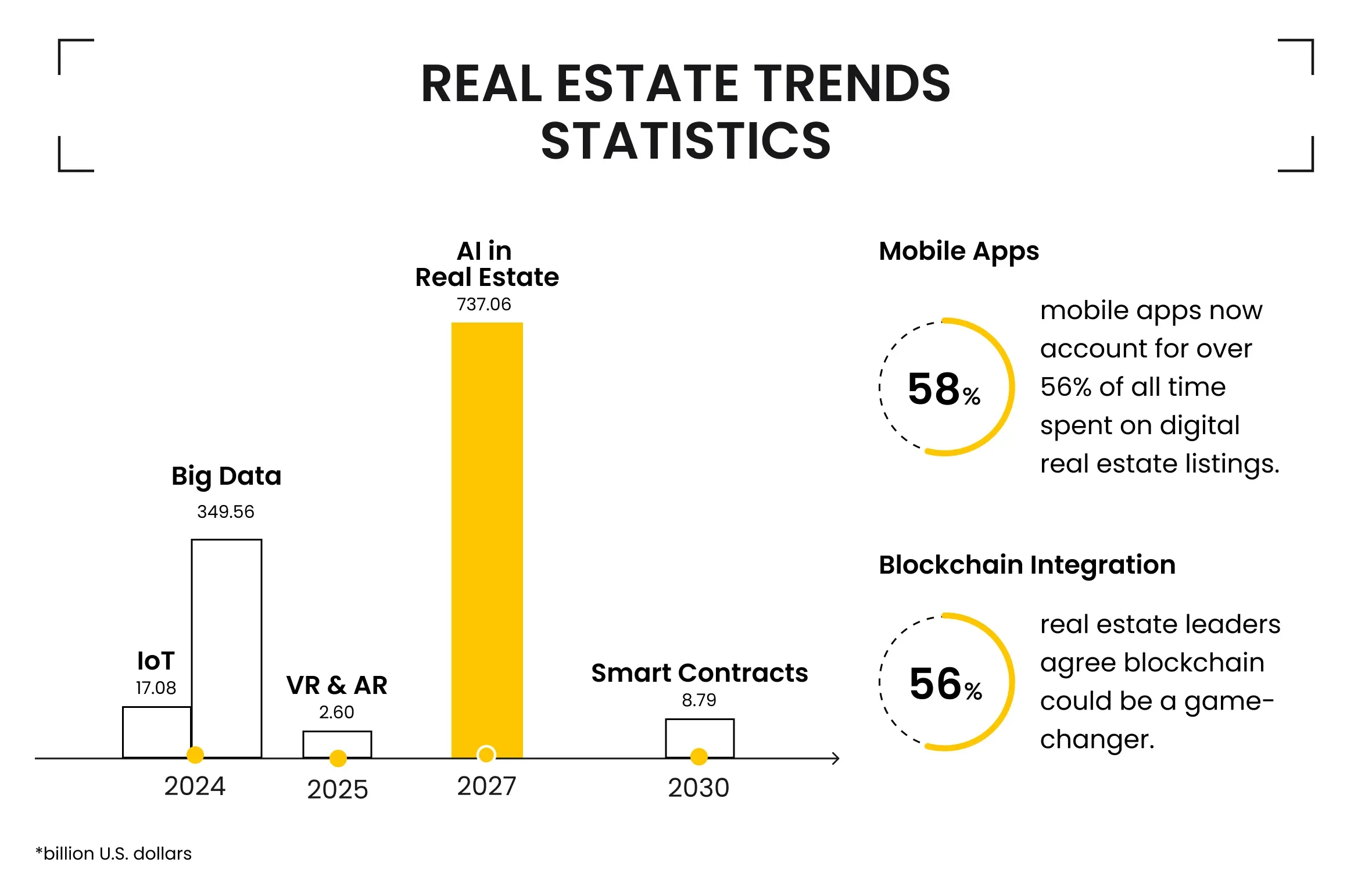
Still, unlike the rest of the fields, software development trends in real estate are less well-known and recognizable. Thus, we would like to pay more attention to the latest Proptech trends. So, why do the latest trends in property management system development matter, and what are today's most important property technology trends?
The Importance of Technology in Real Estate
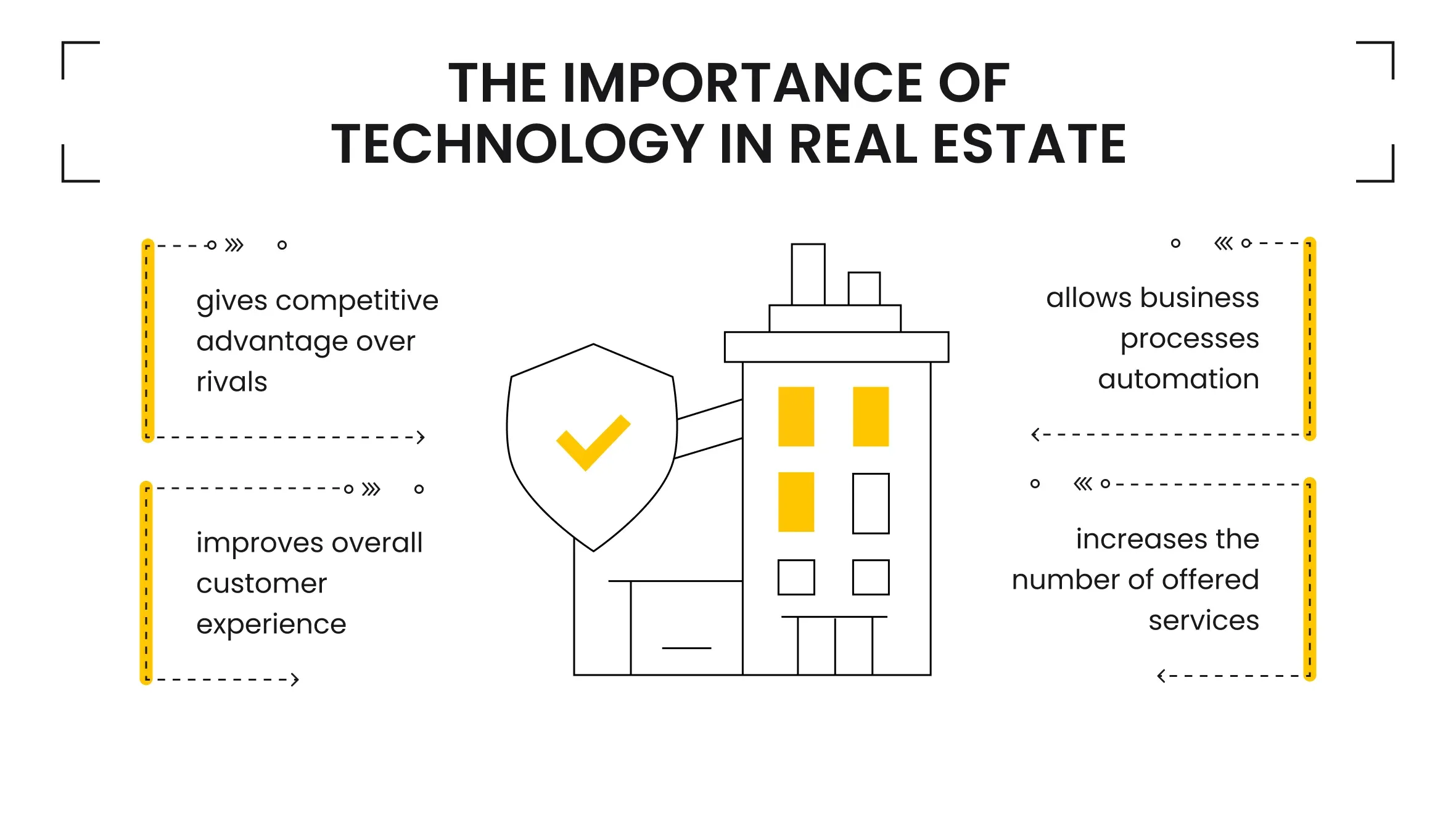
Real estate technology trends are reshaping the industry by improving or changing various aspects of any application or service. Many real estate businesses are adopting the newest property management technology trends to compete.
Frankly speaking, high-quality services are wider than customer treatment. Regardless of the level of your services, you have to offer more convenient and user-friendly features and instruments, that can simplify such a difficult and stressful process, as buying a new home.
For example, having a real estate marketplace with photos and location of property for sale or rent is definitely not among property technology trends. While just a decade ago it seemed like a unique and fresh feature for some, nowadays - it is already a must-have option.
On the one hand, it is hard to predict how many modern real estate technology trends might disappear over time. Some software solutions, popular among businesses today, might fail the time test. Still, it does not mean, that all property technology trends are doomed.
To cut a long story short, some newest real estate technology solutions might disappear in the future but standing still is not an option either. The best way to make an informed choice on which real estate innovations to adopt - is to learn all of them, and then choose the most suited for your business model.
Fortunately, even the smallest business in the real estate industry can offer at least simple construction software development on demand. Yet, to make the most of it, you still have to understand what to include in your future software project.
Top Real Estate Technology Trends in 2024
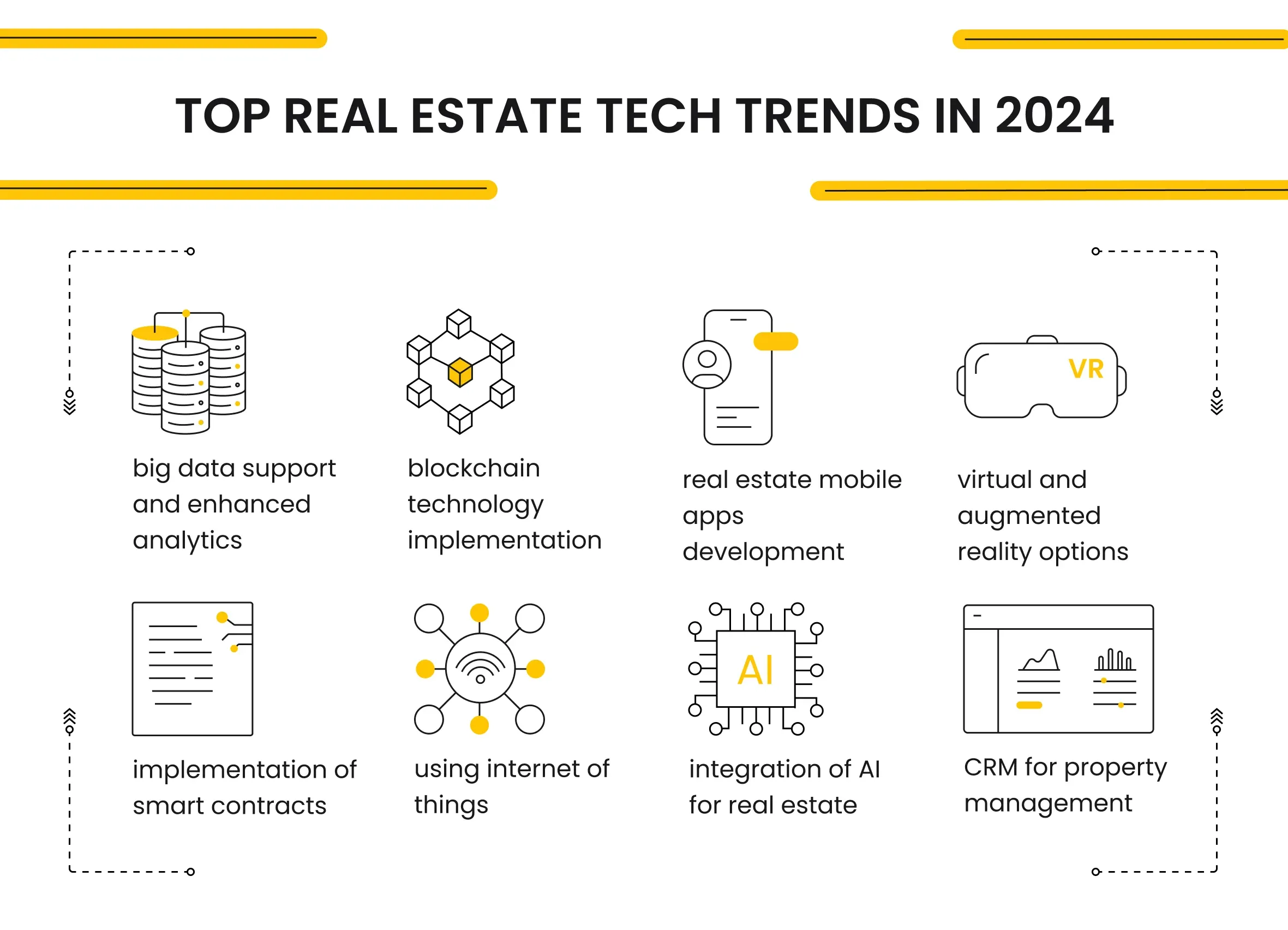
Real estate app development services offer countless solutions for developing new or improving existing project management software for real estate development. Nevertheless, there is no point in explaining why your PropTech application must support image display, efficient mobile applications, etc.
Alternatively, let’s examine the most advanced and emerging real estate tech trends, which are gaining popularity and are still forming the new shape of the real estate industry.
Artificial Intelligence and Machine Learning
On the one hand, it is hard to surprise anyone with an Artificial Intelligence integration. Thanks to the emergence of ChatGPT and its alternatives, the modern AI market is full of open-source and paid AI-driven tools and chatbots.
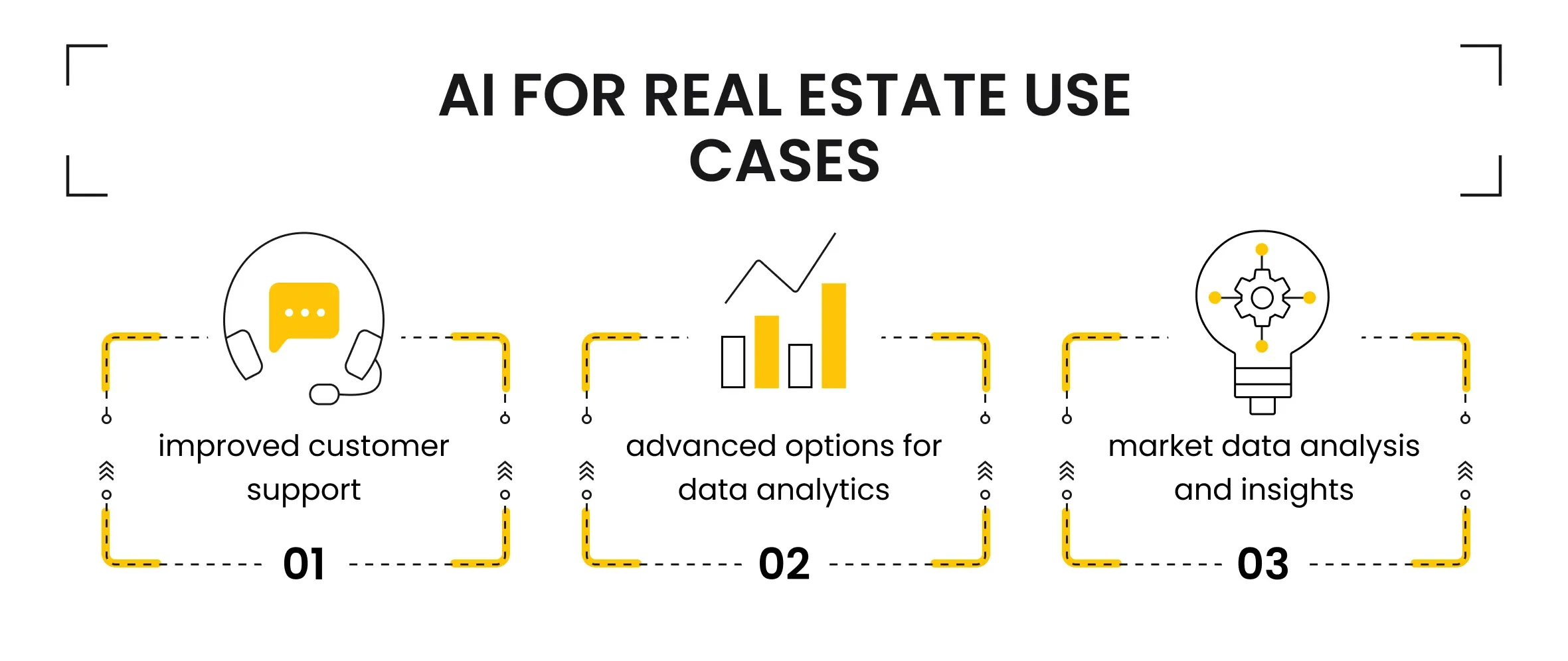
Nevertheless, most such solutions are general and industry-agnostic, i.e. they were not trained specifically for certain niches or spheres. Therefore, your customers most likely won’t be surprised if you integrate a ChatGPT-like chatbot. However, offering conversational AI for real estate is still among the most popular software development trends in real estate.
Alternatively, if you have enough resources and a desire, you can find a dedicated development team, familiar with such technologies and capable of developing advanced AI for property management. Still, don’t forget about the cost and time, required for such complex software development.
Real Estate AI Chatbots
One of the most efficient and cheapest real estate technology trends, related to AI development - is implementing conversational AI for real estate.
Conversational AI for customer support offers multiple benefits for business. Moreover, it is not as long and complex task, as developing AI from scratch. To simplify it, conversational AI for real estate is not very different from other conversational chatbots.
It makes it cheaper and faster to develop or even allows the implementation of a ready-made SaaS solution.
Judging from our own experience, such AI real estate solutions offer multiple bonuses and directly impact the overall performance and customer retention processes. Besides, AI real estate solutions propose tools for various repetitive and routine process automation. So, you can redirect the rest resources to more prioritized or complex tasks.
Big Data & Analytics
Among other real estate technology trends, which can be partly combined with AI real estate solutions is big data management and analytics.
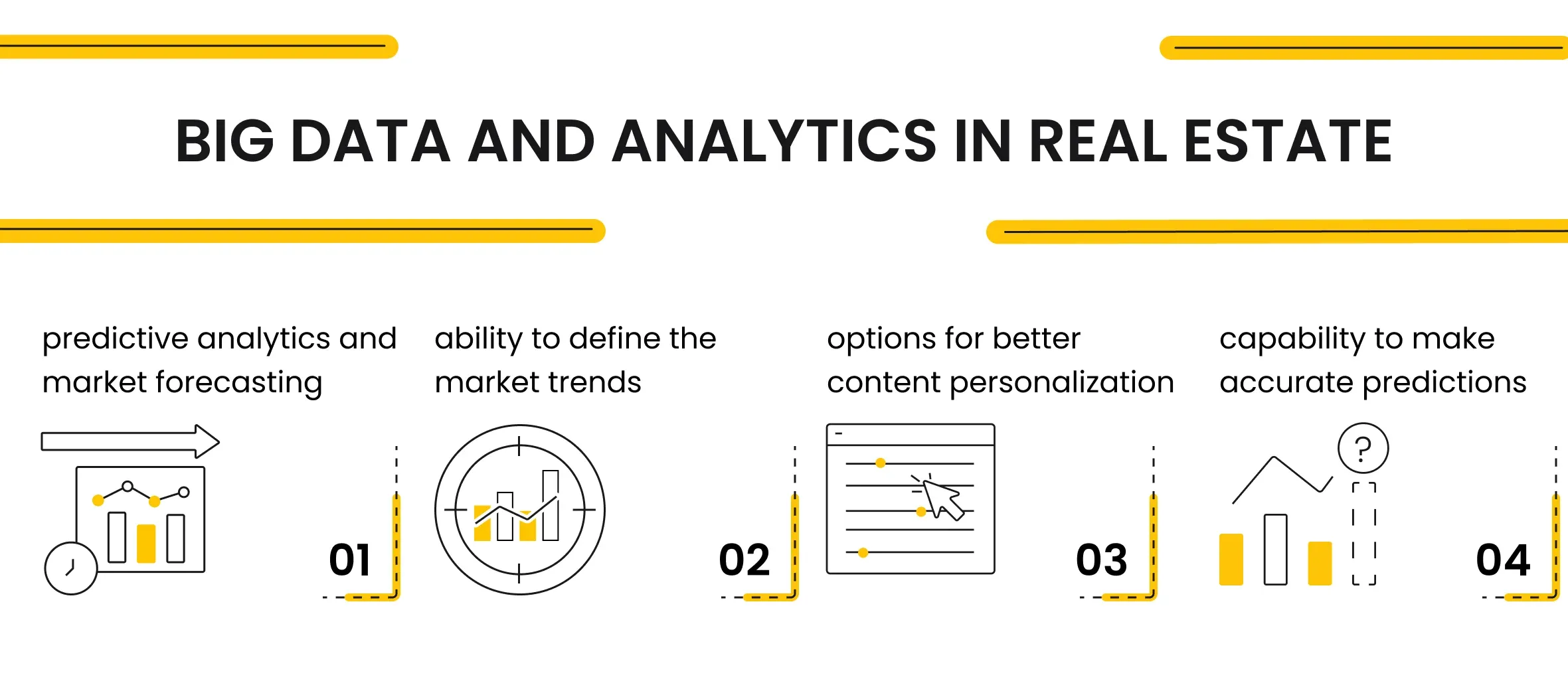
To cut a long story short, many technologies in real estate are designed to simplify and improve big data management and analysis. Most modern apps from this industry are somehow related to data operations like collecting, storing, and processing.
At first, all of them can be taken care of by humans. Nevertheless, when your business scales - the data inputs increase as well, leading to Big Data.
Efficient ways to deal with Big Data simplify and improve multiple business processes, starting with customer experience, and ending with advanced project management.
Fortunately, instruments for dealing with Big Data are available even in terms of construction project management software for small business. This makes Big Data management tools and approaches important real estate technology trends.
Big Data Analytics for Real Estate
Apart from having resources and IT infrastructure, capable of storing arrays of data, it is important to enable the possibility to process and analyze it.
Frankly, having an array of unstructured and unprocessed data gives almost no actual advantage. Big Data analytics for real estate, on the other hand, create a prosperity of ways to improve and change different business aspects and enhance real estate technology, or business services.
Predictive Analytics and Market Forecasting
For example, you can combine a few different real estate tech trends. Particularly, we are talking about the real estate AI chatbot, and software for Big Data Management and Analysis.
As a result, your real estate business can achieve a major advantage over competitors, by having deeper insights. For instance, such technology combinations enable AI sales forecasting software.
Still, it is just a single example of possible real estate innovations and property technology capabilities.
Modern digital transformation in real estate is highly scalable and flexible at the same time. This makes even the wildest dreams possible if you know how to hire a dedicated team.
Blockchain Technology
Blockchain real estate software development is yet another opportunity for the modern real estate industry.
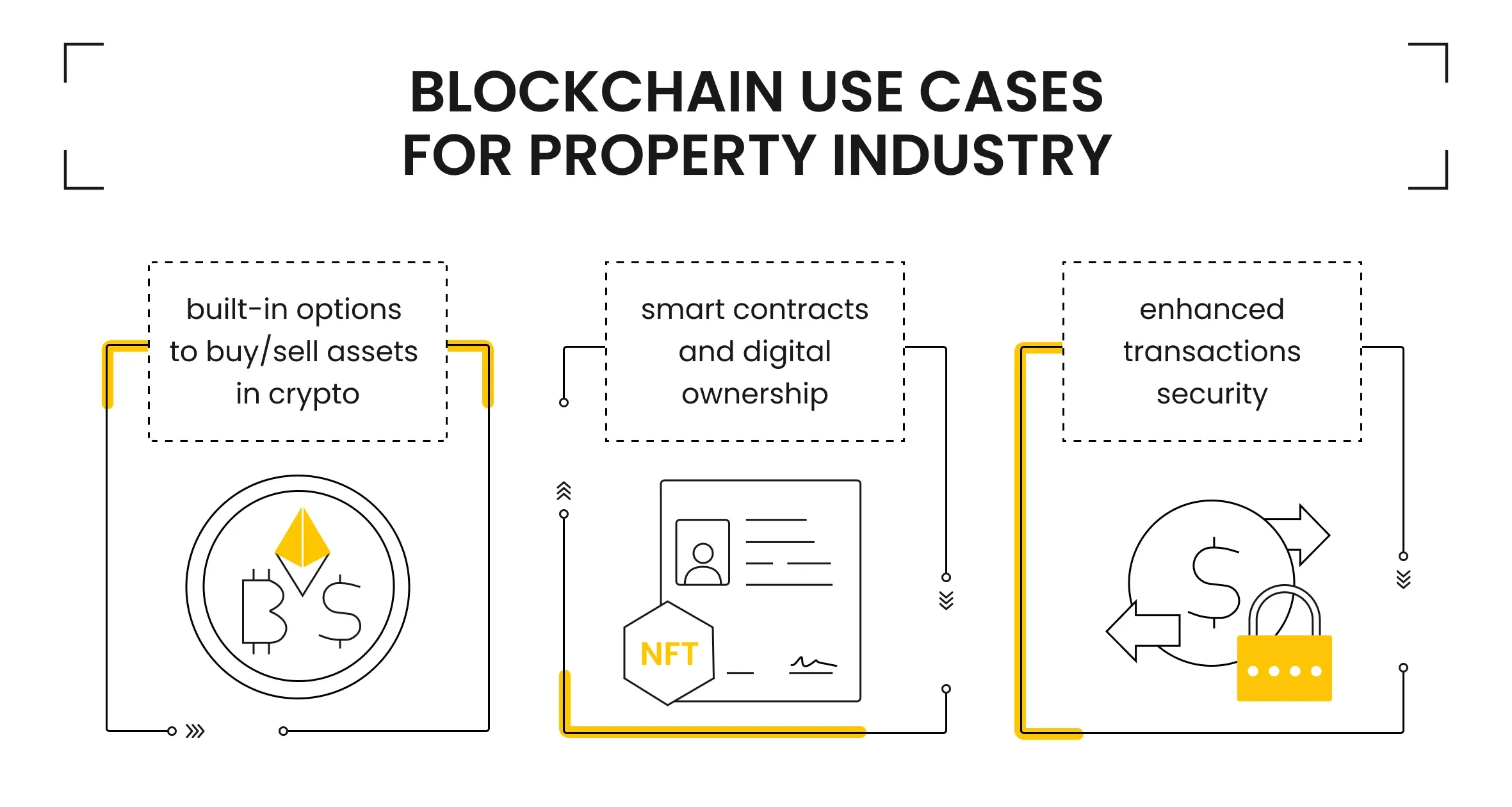
Among the most obvious benefits of blockchain real estate software development, we can name:
- The possibility of enabling a fast and reliable way of paying for the services like renting or buying property. Nowadays, for many such operations, that require precision and a lot of resources, having a built-in option to pay for the services with crypto assets seems a great deal.
- Alternatively, smart contracts can become a real deal-breaker soon, creating an opportunity to upscale safety and creating a digital twin of agreements or other legal documents. Just imagine a real estate automation with paperless buying or selling property.
Eventually, there are numerous ways to implement blockchain real estate software development, which will positively affect the real estate industry, and offer new horizons for all participants.
Virtual and Augmented Reality
Using virtual reality in real estate is also among the crucial real estate tech trends.
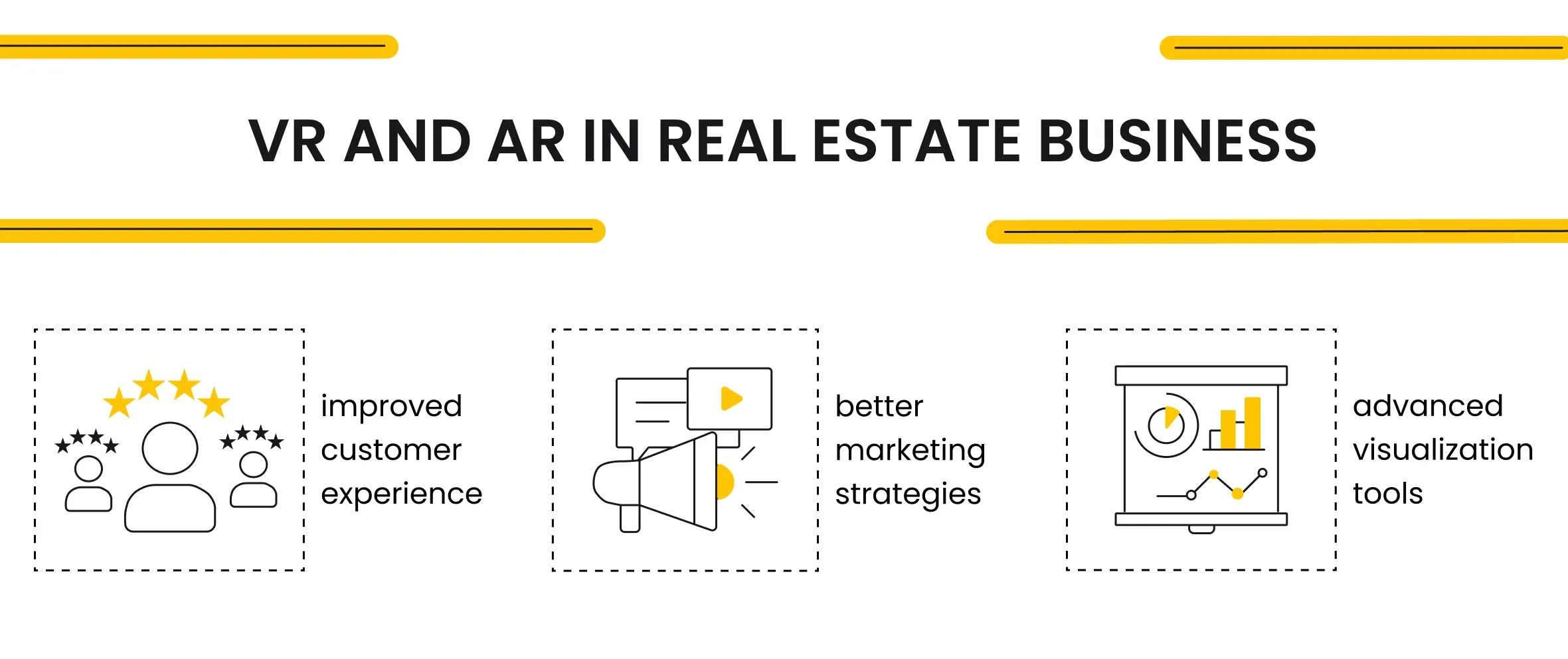
In a nutshell, virtual reality in real estate creates new ways of communication and user experience. As for now, most property marketplaces offer just a few pieces of information about any lot:
- Text description of the property
- Images and video of the place
- Lot location on a map
To sum up, customers have a brief explanation of what they are looking at, a few photos, and a location, where they can check the rest on their own, which takes some time. Alternatively, using virtual reality in real estate applications, businesses can offer an opportunity to have a virtual tour of the location, without the need to visit it physically, unless the customer is satisfied.
Creating digital twins of real estate in 3D is not as difficult, as it might look. Nowadays, VR and AI technologies are relatively cheap and fast to develop, which makes them potential must-haves for real estate digitalization.
Internet of Things
IoT property management is also a crucial aspect to consider.
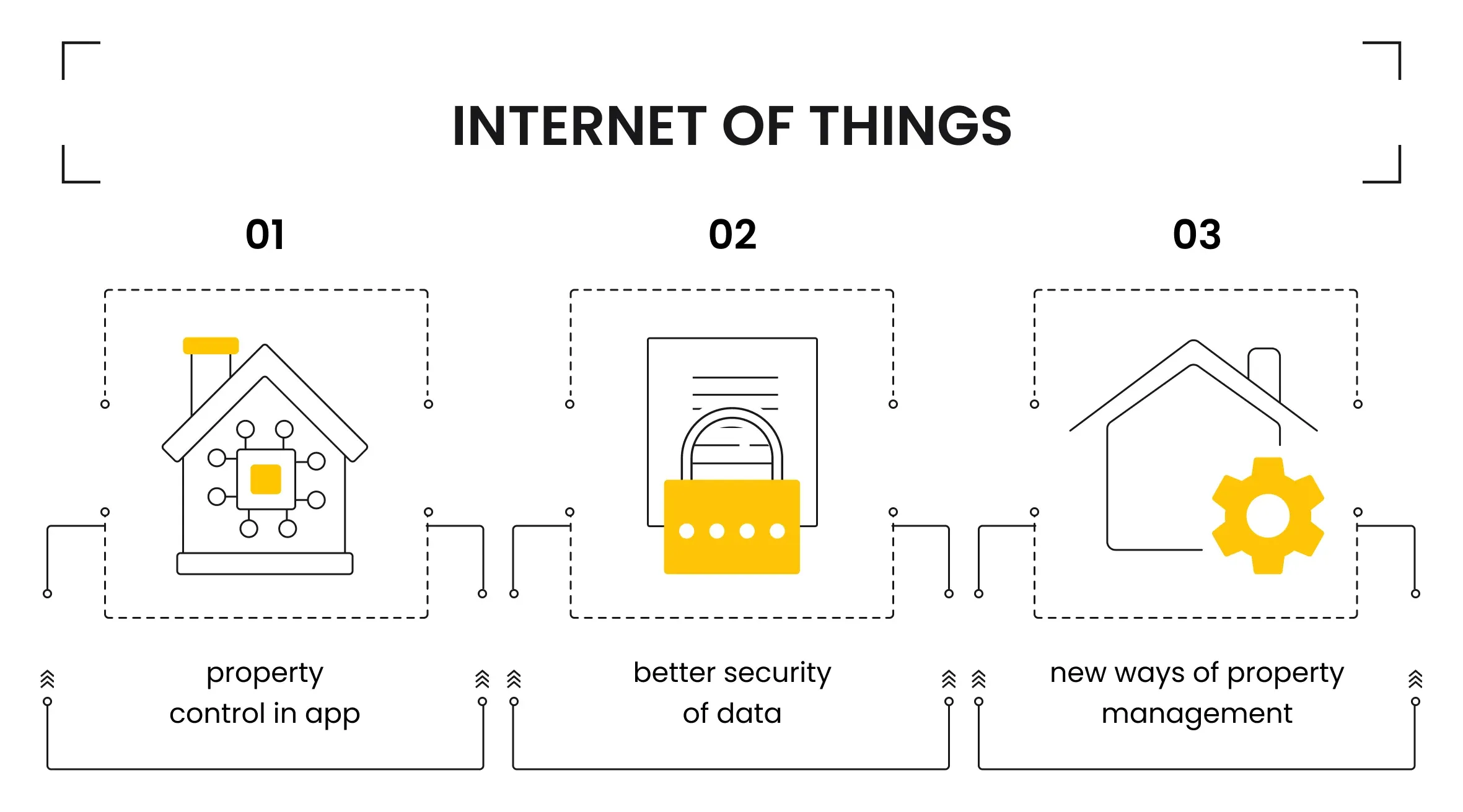
At the moment, the Internet of Things is still perceived as something from the far future. However, IoT property management is gaining its place in each modern house. It gives full information about certain household processes in a single app on a smartphone.
IoT property management and real estate digitalization have already become synonyms. For illustration, many homeowners can start the vacuum cleaning on their way home, or check security cameras, while being on vacation.
Thus, don’t forget about the possibility of adopting IoT, when examining real estate tech trends next time.
Real Estate Mobile App Development
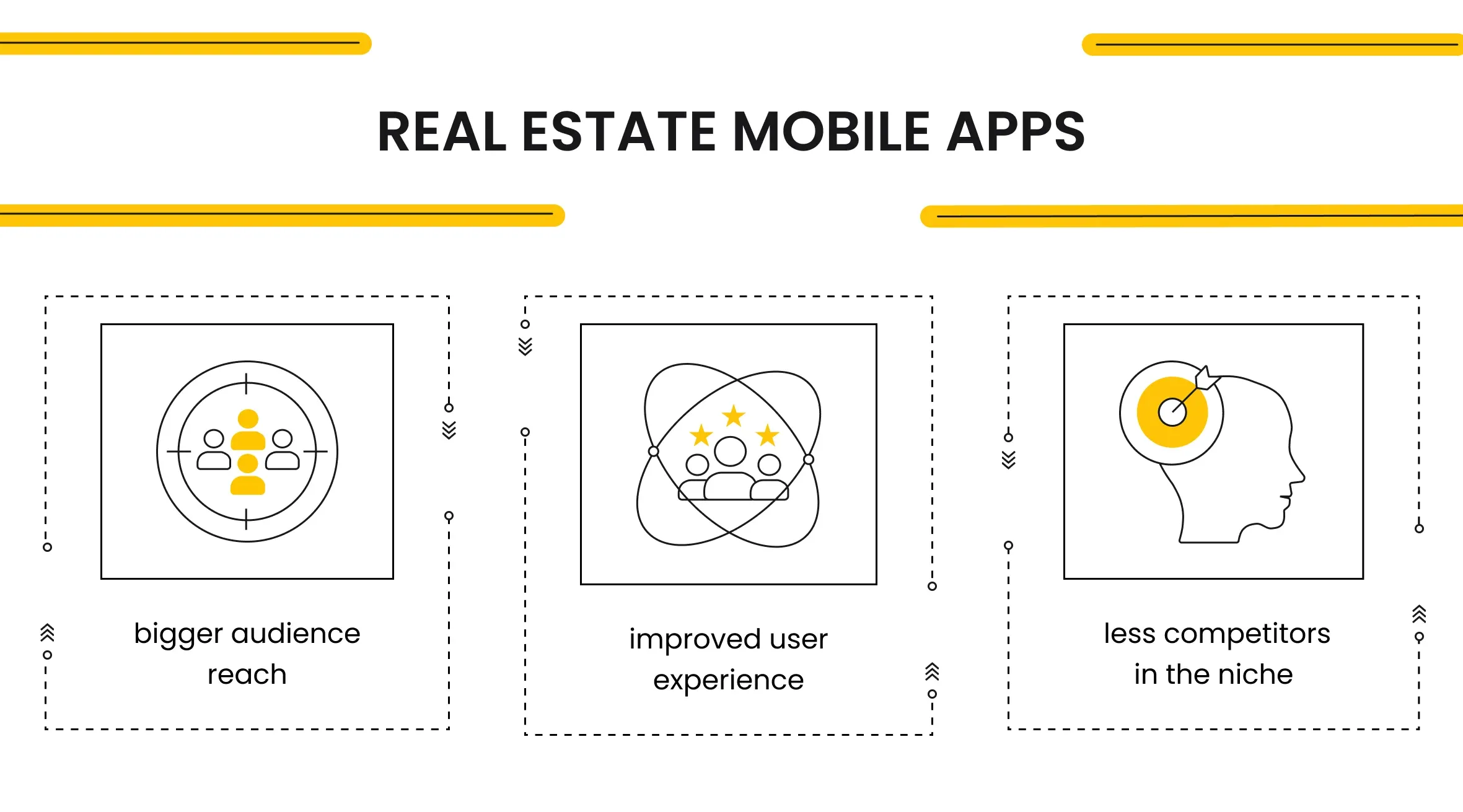
Unlike the rest of the list, real estate mobile app development is not a part of technology trends in real estate. Instead, it is one of the best examples of how technology is changing the real estate industry.
In terms of real estate digitalization, real estate mobile app development has switched from a trend to a must-have option for any business: 73% of homebuyers used various mobile devices to search for property.
Among the most significant benefits of real estate mobile app development are:
- An opportunity to increase target audience reach
- Faster and more comfortable way to share information
- Possibility to text-on-the-go with a real estate agent
- Built-in capacity to perform in-app payments via Apple Wallet or Google Pay
Real Estate CRM Software Development
Last but not least among real estate tech trends is real estate CRM software development.
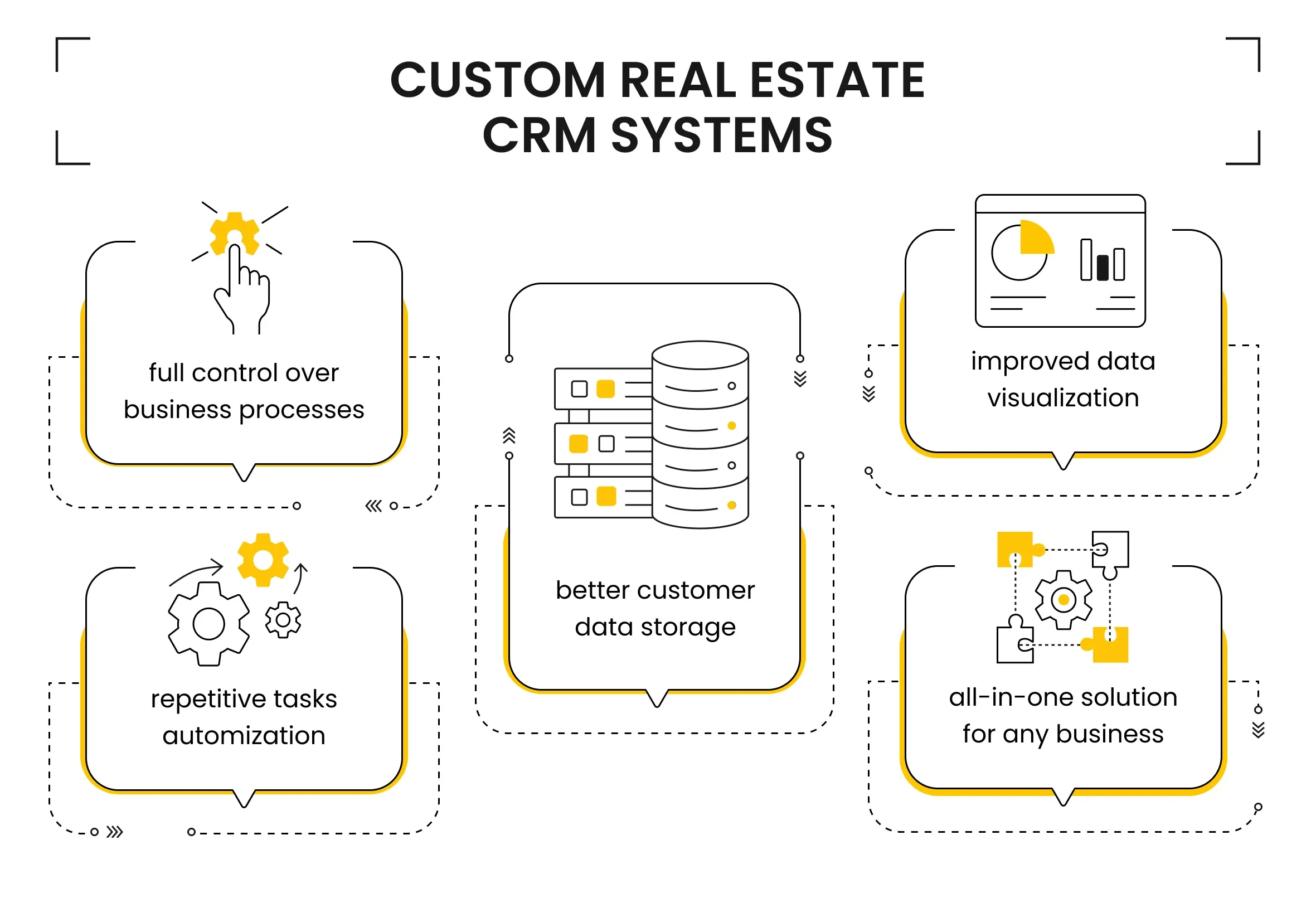
Having such real estate management technology at hand significantly boosts the efficiency and performance of your company, positively impacting countless business processes in the real estate industry.
Like any other custom CRM system, real estate CRM software development must include the needs and expectations of business owners. Nonetheless, real estate app development for administration is one of the hardest and most expensive property management technology trends.
At the same time, real estate CRM software development offers unlimited potential for all business-related processes, including a few aforementioned real estate tech trends and features, real estate automation options, and many other examples of digital transformation in real estate.
Adopting Property Management Technology Trends with Incora
The variety of technology trends in real estate brings challenges.
Even if you want to adopt all real estate tech trends, you should understand how complex and resource-intensive such a task will be. Instead, we recommend you prioritize these technologies in real estate and implement them step-by-step.
Regardless of which PropTech trends you have chosen for integration, the only unchangeable fact is that the best way to do it right - is to find a trustworthy development team with proven experience. Apart from embodying the newest real estate technology in your business, they can advise you on each possible solution and help to choose the best.
To prove our point, we recommend you check our case studies and learn more about how we cooperate with our customers, especially in the project discovery phase.
Alternatively, you are also welcome to contact us and explain your idea, so that we can help you make a choice, you won’t regret!
What’s your impression after reading this?
Love it!
1
Valuable
1
Exciting
1
Unsatisfied
1
FAQ
Let us address your doubts and clarify key points from the article for better understanding.
How can a real estate agent use AI?
A real estate agent can use AI to improve property marketing, provide accurate valuations, enhance client relationship management, generate leads, handle legal compliance, create virtual tours, manage rental properties, and stay competitive by adopting new technologies. Popular AI tools include chatbots, virtual tour software, predictive analytics, and AI-powered CRM systems.
What technology do real estate agents use?
Real estate agents use technologies such as CRM systems, virtual tour software, digital marketing tools, MLS databases, electronic signatures, and mobile apps for efficient property management and client communication.
What is the future of real estate technology?
The future of real estate technology involves advancements in AI for personalized customer experiences, virtual reality for immersive property tours, blockchain for secure transactions, and IoT for smart home integration, all aimed at enhancing efficiency and convenience in buying, selling, and managing properties.
What is the best real estate technology?
The best real estate technology ultimately depends on the specific goals and workflows of the real estate agent or agency. CRM systems are crucial for managing client relationships and organizing property listings effectively. Virtual tour software enhances the property viewing experience by allowing potential buyers to explore homes remotely. Additionally, AI tools can provide valuable insights through data analytics, helping agents make informed decisions and optimize their marketing strategies. Keeping abreast of emerging technologies ensures real estate professionals can adapt and stay competitive in a dynamic market.
What is digital transformation in real estate?
Digital transformation in real estate refers to the integration of digital technologies to streamline processes such as property transactions, marketing, client management, and operations. It involves leveraging tools like CRM systems, virtual tours, AI analytics, and online platforms to enhance efficiency, improve customer experiences, and stay competitive in the modern real estate market.
YOU MAY ALSO LIKE
Let’s talk!
This site uses cookies to improve your user experience. Read our Privacy Policy
Accept
Share this article